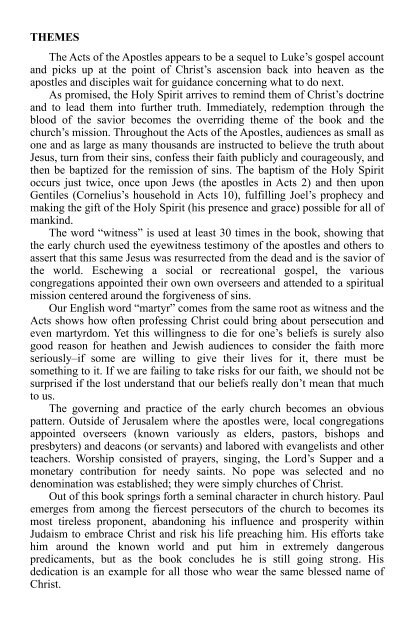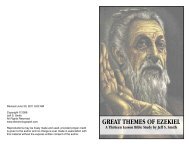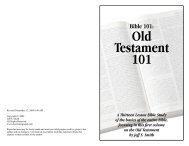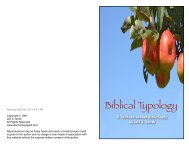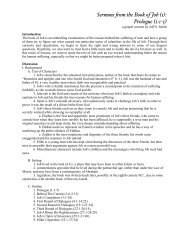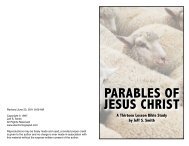New Testament Study Guides - ElectronicGospel
New Testament Study Guides - ElectronicGospel
New Testament Study Guides - ElectronicGospel
Create successful ePaper yourself
Turn your PDF publications into a flip-book with our unique Google optimized e-Paper software.
THEMES<br />
The Acts of the Apostles appears to be a sequel to Luke’s gospel account<br />
and picks up at the point of Christ’s ascension back into heaven as the<br />
apostles and disciples wait for guidance concerning what to do next.<br />
As promised, the Holy Spirit arrives to remind them of Christ’s doctrine<br />
and to lead them into further truth. Immediately, redemption through the<br />
blood of the savior becomes the overriding theme of the book and the<br />
church’s mission. Throughout the Acts of the Apostles, audiences as small as<br />
one and as large as many thousands are instructed to believe the truth about<br />
Jesus, turn from their sins, confess their faith publicly and courageously, and<br />
then be baptized for the remission of sins. The baptism of the Holy Spirit<br />
occurs just twice, once upon Jews (the apostles in Acts 2) and then upon<br />
Gentiles (Cornelius’s household in Acts 10), fulfilling Joel’s prophecy and<br />
making the gift of the Holy Spirit (his presence and grace) possible for all of<br />
mankind.<br />
The word “witness” is used at least 30 times in the book, showing that<br />
the early church used the eyewitness testimony of the apostles and others to<br />
assert that this same Jesus was resurrected from the dead and is the savior of<br />
the world. Eschewing a social or recreational gospel, the various<br />
congregations appointed their own own overseers and attended to a spiritual<br />
mission centered around the forgiveness of sins.<br />
Our English word “martyr” comes from the same root as witness and the<br />
Acts shows how often professing Christ could bring about persecution and<br />
even martyrdom. Yet this willingness to die for one’s beliefs is surely also<br />
good reason for heathen and Jewish audiences to consider the faith more<br />
seriously–if some are willing to give their lives for it, there must be<br />
something to it. If we are failing to take risks for our faith, we should not be<br />
surprised if the lost understand that our beliefs really don’t mean that much<br />
to us.<br />
The governing and practice of the early church becomes an obvious<br />
pattern. Outside of Jerusalem where the apostles were, local congregations<br />
appointed overseers (known variously as elders, pastors, bishops and<br />
presbyters) and deacons (or servants) and labored with evangelists and other<br />
teachers. Worship consisted of prayers, singing, the Lord’s Supper and a<br />
monetary contribution for needy saints. No pope was selected and no<br />
denomination was established; they were simply churches of Christ.<br />
Out of this book springs forth a seminal character in church history. Paul<br />
emerges from among the fiercest persecutors of the church to becomes its<br />
most tireless proponent, abandoning his influence and prosperity within<br />
Judaism to embrace Christ and risk his life preaching him. His efforts take<br />
him around the known world and put him in extremely dangerous<br />
predicaments, but as the book concludes he is still going strong. His<br />
dedication is an example for all those who wear the same blessed name of<br />
Christ.


